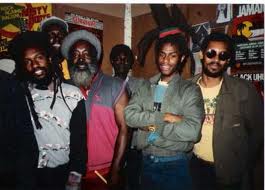Want to get your music out to over 40k radio and sound system dis? CLICK HERE
Stay up-to-date with all that's new at Dancehallreggaeworld, Click Here to subscribe for my updates and don't miss a thing!
Dancehall reggae group Steel Pulse
Dancehall reggae group Steel Pulse - Reggae group steel pulse was formed in 1975 by David Hinds, Bsil Gabbidon and Ronald McQueen. It was formed at Handsworth Wood Boys School in Birmingham, England.
 Dancehall reggae group Steel Pulse
Dancehall reggae group Steel PulseDavid was the lead vocals and he also did most of the song writing,
Basil Gabbidon was lead guitar also vocals and Ronald McQueen was the
bass player.
The group first release was "Kibudu", "Mansetta" and Abuku all of which was released on a small record label call ".Dip"
They
got their internatiio fame through Tom Terrell. He served as their
manager and was instrumental in masterminding the U.S. premiere of Steel
Pulse on the night of Bob Marley's funeral, which was broadcast live
around the world from the 9:30 Club, 930 F Street, N.W., Washington,
D.C. on May 21, 1981.
In 1988, Steel Pulse released State of
Emergency, their most explicitly crossover-oriented album yet. They also
contributed the track "Can't Stand It" to the soundtrack of Spike Lee's
classic Do the Right Thing. In 1991, they released another heavily
commercial album, the Grammy-nominated Victims, which featured the
single "Taxi Driver."
Backing up the song's views, Steel Pulse
filed a class-action lawsuit against the New York City Taxi and
Limousine Commission, charging that drivers discriminated against blacks
and particularly Rastafarians. Founding member Fonso Martin left that
year, reducing Steel Pulse to a core trio of Hinds, Nisbett, and Brown.
Their
backing band still featured Ewen and was elsewhere anchored by
guitarist Clifford "Moonie" Pusey, keyboardist Sidney Mills, trumpeter
Kevin Batchelor, Saxophonist Jerry Johnson and Trombonist Clark Gayton.
The
1992 live album Rastafari Centennial marked the beginning of a return
to the group's musical roots, and earned another Grammy nomination. The
following year, they performed at Bill Clinton's inaugural celebration,
the first reggae band to appear at such an event.
1994's studio album
Vex completed Steel Pulse's re-embrace of classic roots reggae, though
it also nodded to contemporary dancehall with several guest toasters and
a digital-flavored production.
1997's Rage and Fury continued in a similar vein, and was nominated for a Grammy. In 1999, the group released another collection of live performances, Living Legacy.
Fast
forward a long seven years since their previous album, Rage and Fury,
Steel Pulse would return yet again, this time with African Holocaust,
and yet again have their ranks dwindled.
Core members David Hinds (vocals, rhythm guitar) and Selwyn Brown (keyboards, backing vocals) are the only ones to remain from the band's original line-up, but they more than hold their own and they're joined by a deep roster of supporting musicians, a list too long to list.
As
always, the music is what's most important, and on that count, this
Steel Pulse lineup indeed makes the mark. Granted, it did take them
seven years to get the album out, but still it won a Grammy Awards
Nomination for Best Reggae Album of the year.
There's really not
too much else to say about African Holocaust. Longtime fans will know
what to expect. Newcomers should know a few things: above all, Steel
Pulse are known for performing well-written, Afrocentric songs that are
rebellious without being negative or inflammatory, and though the band
membership has changed over the years, the type of songs hasn't, nor has
the steady move away from dancehall that was apparent on the band's
previous album. the message and music remain true to the band's
principles and vision.
Steel Pulse is one of Britain's greatest
reggae bands, in terms of creative and commercial success. Steel Pulse
started out playing authentic roots reggae with touches of jazz and
Latin music, and earned a substantial audience worldwide. Their 1978
debut, Handsworth Revolution, is still regarded by many critics as a
landmark and a high point of British reggae.
By the late '80s, Steel
Pulse had won a Grammy and were working full-fledged crossover
territory. They subsequently returned to a tough-minded, rootsy sound
and have added touches of dancehall and hip-hop along the way.
You might also be interested in UB40 another UK base Reggae Group/Band
Return to Dancehall Reggae music from Reggae group Steel Pulse
Return to Dancehall Reggae group from Reggae group Steel Pulse
Want to learn more about Reggae Music? check these pages below...
New! Talk to me
Was the information helpful? Something needs changing? I welcome your feedback here.
Great Articles You Might Have Missed
Please send us your Feedback, News, Photos, Press Releases, Music and/or Videos to our WhatsApp Number: 1-876-395-8008 or Email: necoflex@gmail.com
Not what you are looking for? Search the web for more Dancehall Reggae music information below...









New! Comments
Have your say about what you just read! Leave me a comment in the box below.